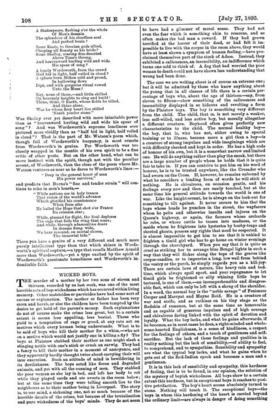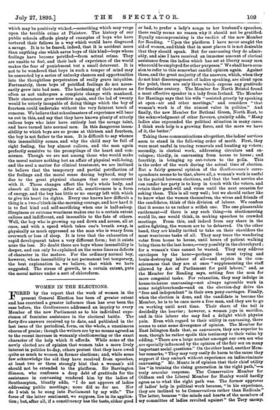WICKED BOYS.
THE murder of a mother by her two sons of eleven and thirteen, recorded by us last week, was one of the most horrible acts of boy-wickedness which has occurred within living memory. Other matricides or parricides have had some sort of excuse or explanation. The mother or father has been very stern and harsh, or else the children have been tempted by the desire to get hold of the parent's money. Such explanations do not of course make the crime less great, but to a certain extent it seems less appalling, less bestial. Those who yield to a temptation of rage or greed, at any rate act on motives which every human being understands. What is to be said of boys who kill their mother for a whim,—who act on a motive which would not justify one in killing a fly ? The boys at Plaistow stabbed their mother as one might slash a stinging nettle with one's stick or crush an earwig. They had a fancy to kill their mother in a moment of annoyance, and they apparently hardly thought twice about carrying their will into execution. Such an attitude of mind is bewildering in its devilishness. The boys acted like fierce and degraded animals, and yet with all the cunning of men. They stabbed the poor woman as she lay in bed, and left her body to rot while they played cards and ate sweets in the room below; but at the same time they were telling smooth lies to the neighbours as to their mother being in Liverpool. The story is, to our mind, a sickening one, not so much because of the horrible details of the crime, but because of the brutalisation and pure wickedness of the boys' minds. They do not seem to have had a glimmer of moral sense. They had not even the fear which is something akin to remorse, and so often makes the bad man a coward. If they had grown terrified at the horror of their deed, or had felt it im- possible to live with the corpse in the room above, they would have at least shown a symptom of human feeling,—have pro- claimed themselves part of the stock of Adam. Instead, they exhibited a callousness, an insensibility, an indifference which turns one cold to think of. A dog that had worried the poor woman to death could not have shown less understanding that wrong had been done.
The case we are writing about is of course an extreme one; but it will be admitted by those who know anything about the young that in all classes of life there is a certain per- centage of boys who, about the age of thirteen—say, from eleven to fifteen—show something of the callousness and insensibility displayed in so hideous and revolting a form by the Plaistow boys. The boy is something very different from the child. The child, that is, is not merely a weaker, less self-willed, and less active boy, but morally altogether a different creature. Boyhood often gives perfectly new
characteristics to the child. The normal healthy boy—
the boy, that is, who has not, either owing to special training or to illness, become more a girl than a boy—is a creature of strong impulses and wide imaginings which are with difficulty checked and kept in order. He has a high code of honour of his own, but it is a somewhat narrow and limited one. He will do anything rather than play the sneak, but there are a large number of people whom he holds that it is quite fair to take in. If you can contrive to put him on his word of honour, he is to be trusted anywhere, like the Crusader who had sworn on the Cross. If, however, he remains unbound by what he considers a binding form of words he will stick at nothing. He is chivalrous, on occasion gentle, and his feelings every now and then are easily touched, but at the same time his general attitude towards the world is one of war. Like the knight-errant, he is always on the look-out for something to tilt against. It never occurs to him that the boys whose heads he punches in the street, the wayfarers whom he pelts and otherwise insults and injures on the Queen's highway, or again, the farmers whose orchards he robs, or whose cattle he teases into madness, or the maids whom he frightens into hysterics by booby-traps and sheeted ghosts, possess any rights that need be respected. It is almost impossible to get him to see that it is unkind to frighten a timid girl who has to go home on winter evenings through the churchyard. When you say that it is quite as .reel as striking her to arrange blae Bengal lights in such a way that they will flicker along the tops of the graves like corpse-candles, or to improvise a long, low wail from behind the vestry or the porch, he simply regards you as a kill-joy- There are certain laws of nature, like heavy rain and bed- time, which always spoil sport, and your repugnance to let timid girls be frightened or silly whining little boys be tortured, is one of them,—an incomprehensible and disagree- able fact, which can only be left with a shrug of the shoulder.
In a word, the normal boy is the " noble savage " of Fenimore Cooper and Marryat and Mayne Reid. He is a creatare of war and strife, and as ruthless on his tiny stage as the Redskin of romance, but at the same time as honourable and as capable of generous impulses and of high courage and chivalrous daring linked with the spirit of devotion and loyalty. What the boy lacks, and what he gains afterwards, if he becomes, as in most cases he does, a right-minded and whole- some-hearted Englishman, is a sense of kindliness, a respect for the feelings of others, and a touch of gentleness and self- sacrifice. But the lack of these feelings and qualities is in reality nothing but the lack of sensibility,—of ability to feel, to comprehend, and to sympathise. Sensibility and sympathy are what the typical boy lacks, and what he gains when he gets out of the Red-Indian epoch and becomes a man and a gentleman.
It is in this lack of sensibility and sympathy, this hardness of feeling, that is to be found, in our opinion, the solution of the mystery of boyish wickedness. All boys show to a certain extent this hardness, but in exceptional boys it reaches to posi- tive petrifaction. The boy's heart seems absolutely turned to stone. Nothing will touch it. The exceptional boys—the boys in whom this hardening of the heart is carried beyond the ordinary limit—are always in danger of doing something which may be positively wicked,—something which may verge upon the terrible crime at Plaistow. The history of our public schools affords plenty of examples of boys who have tortured their fellows in a way which would have disgraced a savage. It is to be feared, indeed, that it is accident more than anything else which saves boys of this kind—boys whose feelings have become petrified—from actual crime. They are unable to feel, and their lack of experience of the world makes the fear of punishment but a small deterrent. It is not to be wondered that boys in such a temper of mind may be converted by a series of unlucky chances and opportunities into the thoughtless perpetrators of really grave iniquities. Fortunately, these boys of petrified feelings do not neces- sarily grow into bad men. The hardening of their nature as often as not undergoes a complete change with manhood. Their characters grow sensitive again, and the lad of twenty would be utterly incapable of doing things which the boy of fourteen could undertake without the very faintest touch of remorse. We believe that schoolmasters of experience will bear us out in this, and say that they have known plenty of utterly callous boys who later have entirely lost the savage taint, and have turned into normal men. In this dangerous insen- sibility to which boys are so prone at thirteen and fourteen, the boy is not father to the man. It is difficult to say whence this insensibility comes, and why the child may be fall of right feeling, the boy almost callous, and the man again perfectly sensitive to the promptings of the heart and con- science. Though we are not among those who would make the moral nature nothing but an affair of physical well-being, and the soul a matter for clinical treatment, we are inclined to believe that the temporary and partial petrifaction of the feelings and the moral sense during boyhood, may be clue to the great physical changes that are . concurrent with it. Those changes affect the boy's whole body, and absorb all his energies. After all, sensitiveness is a form of energy, and the boy has little or no energy left with which to give his heart its rights. Every one knows how difficult a thing is a two-o'clock-in-the-morning courage, and how hard it is to feel kind and self-sacrificing when one is half-asleep. Sleepiness or extreme weariness makes one to a certain extent callous and indifferent, and insensible to the fate of others. Well, the boy who is growing up and down and across, all at once, and with a speed which takes one's breath away, is physically as much oppressed as the man who is weary from overwork or loss of sleep. It is true that the exhaustion of rapid development takes a very different form; but it exists none the less. No doubt there are boys whose insensibility is deeper, and can only be explained on the same lines as defects of character in the mature. For the ordinary normal boy, however, whose insensibility is not permanent but temporary, the best explanation is, we believe, that which we have suggested. The stress of growth, to a certain extent, puts the moral nature under a sort of chloroform.



































 Previous page
Previous page